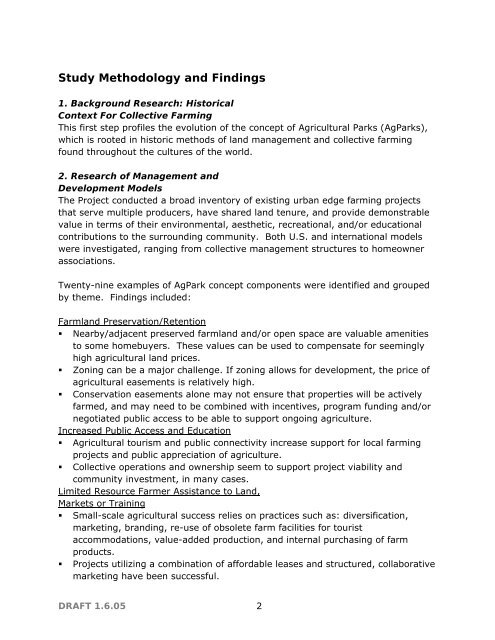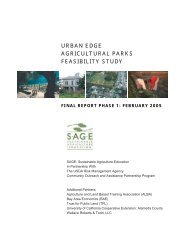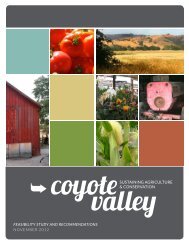<strong>Study</strong> Methodology and Findings1. Background Research: HistoricalContext For Collective FarmingThis first step profiles the evolution of the concept of <strong>Agricultural</strong> <strong>Parks</strong> (Ag<strong>Parks</strong>),which is rooted in historic methods of land management and collective farmingfound throughout the cultures of the world.2. Research of Management andDevelopment ModelsThe Project conducted a broad inventory of existing urban edge farming projectsthat serve multiple producers, have shared land tenure, and provide demonstrablevalue in terms of their environmental, aesthetic, recreational, and/or educationalcontributions to the surrounding community. Both U.S. and international modelswere investigated, ranging from collective management structures to homeownerassociations.Twenty-nine examples of AgPark concept components were identified and groupedby theme. Findings included:Farmland Preservation/Retention• Nearby/adjacent preserved farmland and/or open space are valuable amenitiesto some homebuyers. These values can be used to compensate <strong>for</strong> seeminglyhigh agricultural land prices.• Zoning can be a major challenge. If zoning allows <strong>for</strong> development, the price ofagricultural easements is relatively high.• Conservation easements alone may not ensure that properties will be activelyfarmed, and may need to be combined with incentives, program funding and/ornegotiated public access to be able to support ongoing agriculture.Increased Public Access and Education• <strong>Agricultural</strong> tourism and public connectivity increase support <strong>for</strong> local farmingprojects and public appreciation of agriculture.• Collective operations and ownership seem to support project viability andcommunity investment, in many cases.Limited Resource Farmer Assistance to Land,Markets or Training• Small-scale agricultural success relies on practices such as: diversification,marketing, branding, re-use of obsolete farm facilities <strong>for</strong> touristaccommodations, value-added production, and internal purchasing of farmproducts.• Projects utilizing a combination of af<strong>for</strong>dable leases and structured, collaborativemarketing have been successful.DRAFT 1.6.05 2
Farmworker Housing on the Rural/<strong>Urban</strong><strong>Edge</strong>• The land trust model presents an appealing and functional alternative to otherfarmworker housing models, and insures that housing will remain af<strong>for</strong>dable tofarm families.• Federal funding is available <strong>for</strong> the development of af<strong>for</strong>dable farmworkerhousing.3. Funding ResourcesThe Project identified funding resources, both public and private, that might beapplicable to the development of multifunctional Ag<strong>Parks</strong>.A host of mechanisms were identified that may be tapped to support one or moreaspects of the AgPark concept, including innovative private sector real estatedevelopment. For example, demographic trends and real estate research indicatethat a segment of homebuyers seek local open space and agriculture in their newhome locale, and value its scarcity. The concept of transferring the value achievedby offering agricultural proximity as a homesite amenity may have substantialpotential to fund AgPark concepts.Public funding includes support <strong>for</strong> farm family housing, farmland preservation,rural economic development, and farmer training and assistance. In addition,philanthropic and non–profit funding sources may be available to supportagriculture at the urban edge, including as training <strong>for</strong> new immigrants, organicproduction methods, adoption of new technologies, joint marketing, orfinancial/technical support to farmers unable to make an operating profit.Other resources that bear further investigation include park development andacquisition, environmental protection or enhancement, recreation and/or openspace development, and educational facility development.4. Identification of Producer’s LandAccess NeedsA key step in the process was to identify the potential interest from producers withlimited resources. Producers targeted <strong>for</strong> this research were traditionallydisadvantaged producers of specialty crops (e.g., includes most agriculturalproducts except commodity grain and livestock) whose primary livelihood isfarming. A secondary focus was on potential new farmers, whose lack of access toland is often a main obstacle to farm-entry.The Project conducted outreach through <strong>for</strong>mal and in<strong>for</strong>mal groups of targetproducers as well as through organizations and institutions that serve them. A firstwave survey targeting producers was conducted through mailings, meetings, andon-line tools, to determine need <strong>for</strong> access to land, available resources, agriculturalDRAFT 1.6.05 3
- Page 1 and 2: DRAFTURBAN EDGEAGRICULTURAL PARKSFE
- Page 3: EXECUTIVE SUMMARYOverview of AgPark
- Page 10 and 11: seeking to develop effective collab
- Page 12: INTRODUCTIONHistory of Collective F
- Page 15 and 16: Contemporary Models of Agricultural
- Page 17 and 18: accommodations, value-added product
- Page 19 and 20: 45%, from 5,347 in 1997 to 7,771 in
- Page 21 and 22: information about each site include
- Page 23 and 24: undertaken. It may be best to furth
- Page 25 and 26: IDENTIFICATION OF POTENTIAL AGPARK
- Page 27 and 28: SONOMA COUNTYLaguna Farm 80-acre 3
- Page 29 and 30: The above examples reflect a range
- Page 31 and 32: MARTIAL COTTLE PARK FEASIBILITY STU
- Page 33 and 34: Median household income in the neig
- Page 35 and 36: • Relationship to surrounding nei
- Page 37 and 38: • Education/Research Center: 4-H,
- Page 39 and 40: Management and DevelopmentRole of S
- Page 41 and 42: Beyond the capital costs for the in
- Page 43 and 44: ConclusionThis property has great p
- Page 45 and 46: Ardenwood Historic Farm is the rema
- Page 47 and 48: • Establish Ardenwood as a vibran
- Page 49 and 50: These ideas complement and build on
- Page 51 and 52: • Farmer Housing: None proposed.
- Page 53 and 54: ConclusionsThis project identified
- Page 55 and 56:
Appendix A: Overview of Ag Park Mod
- Page 57 and 58:
The National Trust(England, Wales,N
- Page 59 and 60:
Crystal Waters Village(Malaney, pop
- Page 61 and 62:
McBryde AgriculturalPark (Kauai, HI
- Page 63 and 64:
Farm worker Housing on Rural/Urban
- Page 65 and 66:
Occidental Arts& EcologyCenter(Occi
- Page 67 and 68:
The FarmSchool (Athol,MA)Privatelyo
- Page 69 and 70:
To ensure conservation in perpetuit
- Page 71 and 72:
King County FarmlandPreservation Pr
- Page 73 and 74:
development.Economics/Sources of Fu
- Page 75 and 76:
In 2001, the Trust advanced a susta
- Page 77 and 78:
LandThe cooperatives have sought la
- Page 79 and 80:
ALBA’s Farm Training andResearch
- Page 81 and 82:
• “ALBA Organics” distributio
- Page 83 and 84:
in addition to herbs, flowers, and
- Page 85 and 86:
APPENDIX C: FUNDING SOURCES FOR AGP
- Page 87 and 88:
Public Support for FarmlandPreserva
- Page 89 and 90:
transactions. Transaction types wil
- Page 91 and 92:
Affordable Rural Housing Grant andL
- Page 93 and 94:
farm" program, established farmers
- Page 95 and 96:
Appendix D: Producer Survey Instrum
- Page 97 and 98:
12. Would you be interested and wil
- Page 99 and 100:
Feasibility Study for Urban Edge Ag
- Page 101:
Site BLocationFremont, adjacent to





